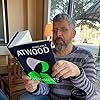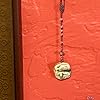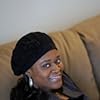To answer questions about
The New Jim Crow: Mass Incarceration in the Age of Colorblindness,
please sign up.
Joan M
My guess is: for the same reason white people don't stop using/selling drugs.
Thebookiemonster
I'll attempt to answer this question using arguments made in the book so everyone gets an idea of the book's stance.
You know, I asked myself this many times throughout the book. Yes, structural and institutional things are in place that, once a black man is caught with drugs in his possession, make his life way more difficult than a white man caught with the same drug. So the solution seems simple--don't possess the drug in the first place.
However, from what I gathered from the book, the key here is discriminatory policing in poor black neighborhoods and discriminatory targeting of black males rather than other populations.
The many studies and crime rate data the author cites show that white kids in suburban neighborhoods are more likely in their lifetimes to sell and use drugs. But society would revolt if we saw a million 16 year old white Timmies from the nice neighborhoods getting locked up for selling Xannies to their classmates because they're decent white folk and Xannies are rich people drugs that nice, safe, white people use.
The simple guideline "don't commit the crime in the first place" stands, but is increasingly unrealistic due to unconscious predatory policing. If police weren't targeting black people and neighborhoods in a disproportionate manner, and due to state-orchestrated or at least racially-motivated discrimination, there wouldn't be so many black people serving insane sentences for possessing small amounts of drugs.
Further, society demands police target these neighborhood, because they house the people white people are scared of. If you saw cops patrolling a nice neighborhood and arresting Timmy, you might think jeez, why don't the cops spend their time doing something worthwhile? Well, that's because we're generally not afraid of Timmy and trust that he's nonviolent. But because of images made popular in the 1980s campaign to start the War on Drugs, the black drug user has always been viewed as a potentially violent and existential threat to our society.
And most of us, well most white people in positions of power at least, are fine with locking these people up and removing them from society.
You know, I asked myself this many times throughout the book. Yes, structural and institutional things are in place that, once a black man is caught with drugs in his possession, make his life way more difficult than a white man caught with the same drug. So the solution seems simple--don't possess the drug in the first place.
However, from what I gathered from the book, the key here is discriminatory policing in poor black neighborhoods and discriminatory targeting of black males rather than other populations.
The many studies and crime rate data the author cites show that white kids in suburban neighborhoods are more likely in their lifetimes to sell and use drugs. But society would revolt if we saw a million 16 year old white Timmies from the nice neighborhoods getting locked up for selling Xannies to their classmates because they're decent white folk and Xannies are rich people drugs that nice, safe, white people use.
The simple guideline "don't commit the crime in the first place" stands, but is increasingly unrealistic due to unconscious predatory policing. If police weren't targeting black people and neighborhoods in a disproportionate manner, and due to state-orchestrated or at least racially-motivated discrimination, there wouldn't be so many black people serving insane sentences for possessing small amounts of drugs.
Further, society demands police target these neighborhood, because they house the people white people are scared of. If you saw cops patrolling a nice neighborhood and arresting Timmy, you might think jeez, why don't the cops spend their time doing something worthwhile? Well, that's because we're generally not afraid of Timmy and trust that he's nonviolent. But because of images made popular in the 1980s campaign to start the War on Drugs, the black drug user has always been viewed as a potentially violent and existential threat to our society.
And most of us, well most white people in positions of power at least, are fine with locking these people up and removing them from society.
Gerard Keown
If only life were so black and white as this facile point. Read the book. Society is complex. You don't go from centuries of oppression from the state and segregation to an equal society over night. A war on drugs that disproportionately targeted a community and incarcerated them for mostly trivial offences only exacerbated the issue into an epidemic.
Chrissy eckert
I have an inkling that this is answered in the book.
Brandon
I will answer your question but first let me ask you a question. If we know for a fact that minorities are unfairly targeted, why do we not seek to change that as well instead of or even in addition to telling people to do better?
Your question falls in line to the "Respectability" narrative she speaks of within the book that was often preached by Cosby (of all people) and Obama. But often times it is not as simple as just don't do/sell drugs. I guess that it could be that simple for recreational uses. But those users are not the only people who turn to drugs. Some get hooked through pain killers, some to cope with stress/depression. Many users are victims and should be treated as such instead of having their lives ruined and ripped apart with drug convictions. Now that the Opioids epidemic has sprouted and essentially has a white face, the narrative around addiction and how to deal with addicts has changed, even despite the fact that many users are obtaining the drugs illegally.
Also, back to the "respectability" politics. Obama and many others have gone on record to admitting to using drugs as young adults and they went on to have brilliant careers. Yet they still allow so many young adults to have their lives derailed that have essentially done the same things as them. It is hypocrisy.
For those caught selling, of course they have to take some accountability. But wherever there is a demand, there is going to be a market and someone willing to provide that product, whether legally or illegally. So if the "War on Drugs" was really a war on "Drugs" and not disenfranchised people, it would seem as though that those waging the war would be looking for ways to curb the demand as well. Now I guess you could argue that is what they are "trying" to do by criminalizing possession but that has been fruitless. So it makes you wonder what the real end goal is. This book answers that and more.
Your question falls in line to the "Respectability" narrative she speaks of within the book that was often preached by Cosby (of all people) and Obama. But often times it is not as simple as just don't do/sell drugs. I guess that it could be that simple for recreational uses. But those users are not the only people who turn to drugs. Some get hooked through pain killers, some to cope with stress/depression. Many users are victims and should be treated as such instead of having their lives ruined and ripped apart with drug convictions. Now that the Opioids epidemic has sprouted and essentially has a white face, the narrative around addiction and how to deal with addicts has changed, even despite the fact that many users are obtaining the drugs illegally.
Also, back to the "respectability" politics. Obama and many others have gone on record to admitting to using drugs as young adults and they went on to have brilliant careers. Yet they still allow so many young adults to have their lives derailed that have essentially done the same things as them. It is hypocrisy.
For those caught selling, of course they have to take some accountability. But wherever there is a demand, there is going to be a market and someone willing to provide that product, whether legally or illegally. So if the "War on Drugs" was really a war on "Drugs" and not disenfranchised people, it would seem as though that those waging the war would be looking for ways to curb the demand as well. Now I guess you could argue that is what they are "trying" to do by criminalizing possession but that has been fruitless. So it makes you wonder what the real end goal is. This book answers that and more.
Jason Carr
You didn't read the book did you Jeremiah. The answers are within.
Meredith
I imagine it's because of the money. If the economy is depressed and there are no jobs, you do what you have to. That doesn't mean it's right but I'm sure making money is a driving force. If they have a conviction for anything on their record, many of them are unable to find normal jobs. Forced to make money somehow, they turn to drugs. This all circles back to the fact that they live in poverty. If there were more jobs open to them, fewer of them would turn to selling drugs. This becomes a vicious circle that it is hard if not impossible to escape from.
Rebecca
"Black people have to work twice as hard to get half as far". While it may be a harsh reality, there is no reason we should not strive to do more.
The answer to your question is that the onus is not on Black people to solve the discrimination against them.
The answer to your question is that the onus is not on Black people to solve the discrimination against them.
Mark Patton
Read the book.
Dave
You're missing the point. First of all, go read medical sources about addiction to see how naïve the "why don't they stop" question is.
Next up, the real point is the disproportionate bit. First ask why that is, then ask what you can do about it.
Next up, the real point is the disproportionate bit. First ask why that is, then ask what you can do about it.
Rebecca Lee
Why does our justice system give disproportionate sentences for drug crimes, even greater than for those of violent crimes? Why would minor drug crimes entail a sentence of many years rather than treatment? Very complicated issues.
Suz
I can't help but wonder if Jeremiah also asks what a rape victim was wearing at the time.
Amanda
The answer lies in your use of the word "disproportionately" - the problem isn't that they use drugs more than whites, it's that the system that charges them is unfair in a thousand ways.
John Lockwood
Well, one of the answers given in the book is that black people should stop selling and using drugs, just as white people should. The point is that they do it in the same amounts, and black people (especially young ones), are prone to making the same dumb mistakes as white people (especially young ones).
Serious counter-question. If you recognize (in the first part of your question), that blacks (and minorities in general) are "disproportionately charged", which means an injustice is being perpetrated, why do you blame the victims of the injustice rather changing the minds and the hearts of the perpetrators?
Serious counter-question. If you recognize (in the first part of your question), that blacks (and minorities in general) are "disproportionately charged", which means an injustice is being perpetrated, why do you blame the victims of the injustice rather changing the minds and the hearts of the perpetrators?
Alex
In addition to the point that blacks and whites use drugs in similar proportions yet blacks and latinos are the ones going to prison for it in disproportionate numbers, another point the book makes to cover this question is that stigmatized populations internalize their stigma. "If the world is going to see me as bad no matter WHAT I do, I'll show them how bad I can be." Many black men feel that they can't win no matter what they do. Not to mention the fact that addiction is a tough thing to beat.
There's likely a project housing answer to this as well, as black populations were segregated into poorer neighborhoods, allowing for that type of behaviour to flourish.
It's moreso a systemic problem, not one related to a personal failing.
There's likely a project housing answer to this as well, as black populations were segregated into poorer neighborhoods, allowing for that type of behaviour to flourish.
It's moreso a systemic problem, not one related to a personal failing.
Nikki
Hi Jeremiah, Life isn't all at easy and I'm sure you're aware of that and for African Americans it's even harder. I encourage you to read the book if you haven't. Keep an open mind. The answer is in front of you. You just have to be willing to see it.
Linda Aronovsky
Really? You're seriously asking this? Sounds like this is the perfect book for you to read.
Adam Schneider
I think a better question is: why is cannabis illegal, and alcohol is not?
Debbie
Did you read the book Jeremiah?
Nicole Thompson
Is this really a question, or are you just trolling?
Signe
Thebookiemonster answered this excellently, but just think about any habit you may have that you can't break -- eating junk, smoking, drinking too much, saying inappropriate things, whatever! It's hard. It's even harder when you're supporting 8 people in your family with the money you earn from your undesirable behaviour/lifestyle, and you have no other skills, or opportunity to learn them. You feel like shit; you feel guilty -- but everyone is eating; you're keeping them alive. It's a real bind. Really, what should people do? The system has made it pretty impossible to get out of the lifestyle. It's a miracle that people do at all, with all the odds stacked against them as they are.
Bookman
Considering your question, I can only conclude that you didn't read the book.
Mr. Wakiki
I am right at that point in the book.
a) before the direct answer --- your question is why you might not understand systematic racism. Why do you think one race needs to be better than another... because police enforce laws in a racist manner?
b) the black lives matter movement was not as strong three years ago as it is now, but it is clear people of color are trageted
from the author/the book
1) no one is perfect, that includes people of color, but when a black person makes a mistake, they are targeted and not only are more likely to be arrested, but also the charges are much higher
2) if stop and frisk targeted white people, or guys in suit, there would be a pubic outcry and the act would be stopped, no one would say "Hey white guy, don't do crimes.
--- that is you are ignoring some constitutional rights people of color are not given.
3) as the book points out in varying ways, economic opportunities are not as available for people of color as they are for whites.
4) have you ever gone 10 miles an hour over the speed limit? Do you know the consequences of that and the results are way more likely to hurt others than if you were to smoke pot... but when it comes to law enforcement blacks with five joints face higher consequences
the book has another 100 reasons, you should consider reading it
a) before the direct answer --- your question is why you might not understand systematic racism. Why do you think one race needs to be better than another... because police enforce laws in a racist manner?
b) the black lives matter movement was not as strong three years ago as it is now, but it is clear people of color are trageted
from the author/the book
1) no one is perfect, that includes people of color, but when a black person makes a mistake, they are targeted and not only are more likely to be arrested, but also the charges are much higher
2) if stop and frisk targeted white people, or guys in suit, there would be a pubic outcry and the act would be stopped, no one would say "Hey white guy, don't do crimes.
--- that is you are ignoring some constitutional rights people of color are not given.
3) as the book points out in varying ways, economic opportunities are not as available for people of color as they are for whites.
4) have you ever gone 10 miles an hour over the speed limit? Do you know the consequences of that and the results are way more likely to hurt others than if you were to smoke pot... but when it comes to law enforcement blacks with five joints face higher consequences
the book has another 100 reasons, you should consider reading it
Laura
They do. The book cites studies showing that when whites were pulled over, they were actually several times MORE likely to be carrying drugs than Black or latinx drivers. But discriminatory enforcement means they never get caught. 1 in 10 people uses drugs. It stands to reason most of them, black or white, are never caught. But those who do are overwhelmingly Black people.
Andrea
Here is a better question- why do people (mostly of color) go to jail for low level drug offenses, but people like the Sackler family of Purdue Pharma, who have propagated the opioid crisis, and, knowingly waged a false campaign about the safety of opiods, not in jail. The damage done to our society by the Sackler's far outweighs anything most people in jail have done, but still, they walk free. Sure, the Sackler's may lose 2 of their 3 billions in lawsuits, but they are likely to retain at least one billion of their money because it is stashed overseas. Talk about racial disparity in bringing people to justice for their crimes! Also, many people who get into the system aren't actually dealing drugs- one only has to be stopped and arrested, not actually convicted, to be denied housing, and other vital aspects of living in our society. Lastly, the author contends that whites actually take/sell drugs at a much higher rate than blacks, it's just that blacks are doing so on the street where it is easier for them to be discovered. The book is excellent and at the same time doesn't deliver many answers as to how to fix the racial disparity in the criminal justice system.
Braeden
https://eji.org/news/nixon-war-on-dru...
"Did we know we were lying about the drugs? Of course we did"
"The Nixon campaign in 1968, and the Nixon White House after that, had two enemies: the antiwar left and Black people. You understand what I’m saying? We knew we couldn’t make it illegal to be either against the war or Black, but by getting the public to associate the hippies with marijuana and Blacks with heroin, and then criminalizing both heavily, we could disrupt those communities. We could arrest their leaders, raid their homes, break up their meetings, and vilify them night after night on the evening news. Did we know we were lying about the drugs? Of course we did.”
"Did we know we were lying about the drugs? Of course we did"
"The Nixon campaign in 1968, and the Nixon White House after that, had two enemies: the antiwar left and Black people. You understand what I’m saying? We knew we couldn’t make it illegal to be either against the war or Black, but by getting the public to associate the hippies with marijuana and Blacks with heroin, and then criminalizing both heavily, we could disrupt those communities. We could arrest their leaders, raid their homes, break up their meetings, and vilify them night after night on the evening news. Did we know we were lying about the drugs? Of course we did.”
George Hong
the answer is only a few people can break the cycle of poverty and crime. here is one fellow who goes by the handle Conservative Guy. grew up in the hood, sold drugs, did petty crimes. Somehow he managed to straighten himself up by taking on conservative values. His videos are about his take on black issues. https://www.youtube.com/channel/UC4CE...
Tom
In my experience, when someone (including myself) asks "Why don't they just...?", they will very likely not appreciate/understand the answer.
Sue Myers
Obviously you did not read the book.
Jeremiah
I think the best answer to this question is found in another book, Hillbilly Elegy which chronicles the hopelessness and despair in another marginalized group in the US - socially disadvantaged whites in appalachia. The prescription for the problem of the opioid epidemic is applicable to both groups: escape your self-defeating culture and pull yourself up by your own bootstraps. Of course this is unpopular politically but it places the onus for solving issues on the person rather than unproductively falling into the culture of victimhood.
Mari
Blacks Americans also use and sell drugs far more often then white Americans, so it is impossible to say if there is a disproportionate amount of charges or not.
Stephen
Why didn't Italians, Irish, Poles, and Jews stop selling alcohol in the 1920s and 30s? They did--after Prohibition was repealed, and the black-market profits disappeared.
Jay Breeding
Jeremiah, I’m sure you are not still reading answers to your two year old question but I’ll jump in anyway. My initial impressions of your question was that you must not have read the book and—why don’t you read the book? My second impression was that the two parts of your question are unrelated. You are implying that unequal administration of justice is solved by the personal behavior of the victimized group. If the behavior of illegal drug use was ended the problem of unequal justice would still arise in some other form.
And while I am on this, another point made by the author that no one has yet brought up, one that you would read about if you would read the book, is that our choice to solve the problem of drug use is a questionable one. Punishment as a deterrent to drug use is ineffective. Punishment may make us feel good, but it does not address the roots of the behavior. When the War on Drugs was begun, so began also the transfer of budget monies away from prevention and treatment to militant enforcement and prisons. Just reading this book also helps one understand what is meant by the “Defund the Police” movement. It is really about returning back to the pre-80s era of policing.
And while I am on this, another point made by the author that no one has yet brought up, one that you would read about if you would read the book, is that our choice to solve the problem of drug use is a questionable one. Punishment as a deterrent to drug use is ineffective. Punishment may make us feel good, but it does not address the roots of the behavior. When the War on Drugs was begun, so began also the transfer of budget monies away from prevention and treatment to militant enforcement and prisons. Just reading this book also helps one understand what is meant by the “Defund the Police” movement. It is really about returning back to the pre-80s era of policing.
Rachel
This book best explained to me this conundrum of "why don't they just stop?"
"Unbroken Brain" by Maia Szalavitz
Brief recap interview with the author of: http://www.pointofinquiry.org/hooked_...
Link: https://www.goodreads.com/sharings/17795
"Unbroken Brain" by Maia Szalavitz
Brief recap interview with the author of: http://www.pointofinquiry.org/hooked_...
Link: https://www.goodreads.com/sharings/17795
About Goodreads Q&A
Ask and answer questions about books!
You can pose questions to the Goodreads community with Reader Q&A, or ask your favorite author a question with Ask the Author.
See Featured Authors Answering Questions
Learn more



























